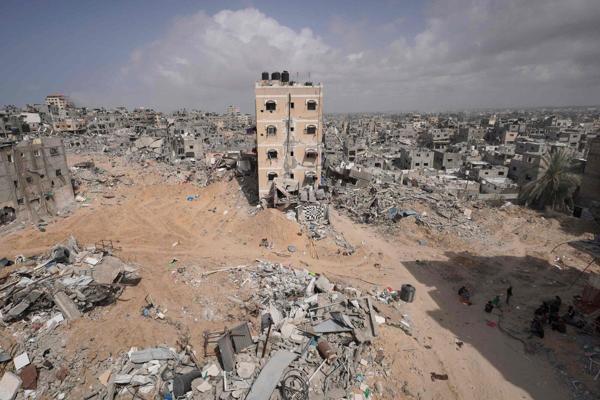Envoys push for Gaza truce before Ramadan starts next week
JERUSALEM


Envoys pushed on with efforts for a Gaza truce and hostage release deal in Cairo talks Wednesday, hoping to halt nearly five months of fighting with days to go before Ramadan.
U.S. President Joe Biden had urged Hamas to accept a ceasefire plan with Israel before the Muslim fasting month begins, which could be as early as Sunday depending on the sighting of the crescent moon.
As negotiators in Egypt sought to overcome tough stumbling blocks, deadly fighting again rocked Gaza where the U.N. warns famine looms and desperate crowds have stopped and looted food aid trucks.
Gazans were waiting to collect bags of flour outside an office of the U.N. agency for Palestinian refugees, UNRWA, in Rafah, now home to nearly 1.5 million Palestinians, most of them displaced by the war.
"The flour they provide is not enough," said displaced man Muhammad Abu Odeh. "They do not provide us with sugar or anything else except flour."
In Khan Yunis, dozens of people went to inspect their homes before streaming out along streets lined by bombed-out buildings carrying what belongings they could recover after Israeli forces pulled out of the city centre, an AFP correspondent said.
The army has yet to respond to an AFP request to confirm such a withdrawal.
Biden on Tuesday called on Hamas to accept the truce plan brokered by U.S., Qatari and Egyptian mediators, saying "it's in the hands of Hamas right now".
The proposed deal would pause fighting for "at least six weeks", see the "release of sick, wounded, elderly and women hostages" and allow for "a surge of humanitarian assistance", the White House said.
One known sticking point centres on an Israeli demand for Hamas to provide a list of about 100 hostages believed to still be alive — a task Hamas says it is unable to complete while bombing continues.
The Palestinian Islamist group said in a statement it had "shown the required flexibility with the aim of reaching an agreement", insisting on a complete halt to the fighting.
Ramadan tensions
In past years, violence has flared during Ramadan in annexed east Jerusalem's Al-Aqsa mosque compound — Islam's third-holiest site and Judaism's most sacred, known to Jews as the Temple Mount.
Hamas has urged Muslims to flock there in great numbers, as they do every year, while some Israeli far-right politicians have urged restrictions.
Israel has said Muslims will initially be allowed into the site "in similar numbers" as in recent years, but that this will be followed by a weekly "situation assessment".
The war began after Hamas launched the Oct. 7 attack on southern Israel that resulted in about 1,160 deaths, most of them civilians, according to an AFP tally based on official Israeli figures.
The militants also took around 250 hostages, and Israel believes 99 of them remain alive in Gaza and that 31 have died.
Israel's retaliatory offensive has killed at least 30,717 people, mostly women and children, according to the Gaza health ministry.
Israeli Prime Minister Benjamin Netanyahu has vowed to push on with the campaign to destroy Hamas, before or after any truce deal.
The Israeli army said Wednesday it lost one more soldier in Gaza, taking the total killed to 247 since ground operations began on Oct. 27.
'Widespread starvation'
While the war has reduced vast stretches of Gaza to a wasteland of gutted buildings and rubble, the siege has sparked a humanitarian disaster for its 2.4 million people.
Hunger has reached "catastrophic levels" in the north, the U.N. World Food Programme has warned.
"Children are dying of hunger-related diseases and suffering severe levels of malnutrition," it said, with the latest victim according to the health ministry being a 15-year-old girl who died at Gaza City's Al-Shifa Hospital.
Health ministry spokesman Ashraf al-Qudra said "the famine in northern Gaza has reached lethal levels" and could claim thousands of lives unless Gaza receives more aid and medical supplies.
South Africa on Wednesday petitioned the International Court of Justice to impose more emergency measures against Israel over what it described as the "widespread starvation" occurring in Gaza as a result of its offensive.
It is the second time Pretoria has asked the court for additional measures — its first request in February was denied.
British foreign minister David Cameron on Wednesday pressed Israel to increase the flow of aid into Gaza.
"We are still not seeing improvements on the ground. This must change," Cameron said he told Israeli war cabinet member Benny Gantz during a meeting.
More than 100 people were reported killed in bloody chaos last week when thousands of people swarmed aid trucks. Gaza officials blamed the deaths on Israeli gunfire, while the army insisted most were trampled or run over.
Another truck convoy was diverted by Israeli troops within Gaza late Tuesday and then stopped by "a large crowd of desperate people who looted the food", said the WFP.
Jordanian, U.S. and other planes have repeatedly airdropped food into Gaza.
But WFP deputy chief Carl Skau said "airdrops are a last resort and will not avert famine".
Israel, which has recalled its U.N. envoy in a sign of growing tensions, said the Security Council should "designate Hamas immediately as a terrorist organisation" and impose sanctions on it.
Government spokesman Eylon Levy also demanded "a fierce condemnation" of sexual violence committed during the Hamas attack, after a U.N. report found "reasonable grounds to believe" there had been instances of rape on Oct. 7.
